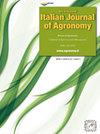Salt-affected soils: field-scale strategies for prevention, mitigation, and adaptation to salt accumulation
IF 2.1
3区 农林科学
Q1 AGRONOMY
引用次数: 3
Abstract
The area of salt-affected soils is increasing globally, mainly due to land use and management malpractices, which can threaten soil health and the sustainability of farms. Climate change is likely to increase the prevalence of salt-affected soils in many agricultural areas due to increased aridity and, in coastal areas, due to the increase in sea water level. The causes and processes that develop salt-affected soils are diverse and can result in soil salinity, sodicity, alkalinity, or a combination of these conditions. There is a need to continuously update strategies to tackle salt-affected soils, finding solutions tailored at different scales. This work presents a review of the current knowledge related to salt-affected soils and identifies specific strategies and related case studies for the prevention, mitigation, and adaptation to salt accumulation in soils at the field scale while addressing their limitations, advantages, research needs, and innovation potential. The presented case studies show that adequate irrigation management and drainage can be used as a preventive measure to counter salt accumulation in soils. Phyto and bioremediation can be effective practices for the mitigation of soil sodicity. Leaching and drainage can be effective measures for mitigation of soil salinity. Crop rotation and management of soil organic matter can be used as adaptative measures that improve plant tolerance to salt-affected soils, while a newer approach, microbial management, shows innovation potential as an adaptative measure.受盐影响的土壤:预防、缓解和适应盐积累的田间战略
全球受盐影响的土壤面积正在增加,这主要是由于土地利用和管理不当,这可能威胁土壤健康和农场的可持续性。由于干旱加剧,气候变化可能会增加许多农业地区受盐影响的土壤的流行率,而在沿海地区,由于海平面上升。形成受盐影响土壤的原因和过程多种多样,可能导致土壤盐度、碱度、碱度或这些条件的组合。有必要不断更新应对受盐影响土壤的策略,找到不同规模的解决方案。这项工作回顾了当前与受盐影响土壤相关的知识,并确定了在实地范围内预防、缓解和适应土壤中盐分积累的具体策略和相关案例研究,同时解决了它们的局限性、优势、研究需求和创新潜力。所提供的案例研究表明,适当的灌溉管理和排水可以作为防止土壤中盐分积累的预防措施。植物修复和生物修复是缓解土壤碱度的有效措施。浸出和排水是缓解土壤盐分的有效措施。作物轮作和土壤有机质管理可以作为提高植物对受盐影响土壤耐受性的适应措施,而微生物管理这一新方法作为一种适应措施显示出创新潜力。
本文章由计算机程序翻译,如有差异,请以英文原文为准。
求助全文
约1分钟内获得全文
求助全文
来源期刊

Italian Journal of Agronomy
AGRONOMY-
CiteScore
4.20
自引率
4.50%
发文量
25
审稿时长
10 weeks
期刊介绍:
The Italian Journal of Agronomy (IJA) is the official journal of the Italian Society for Agronomy. It publishes quarterly original articles and reviews reporting experimental and theoretical contributions to agronomy and crop science, with main emphasis on original articles from Italy and countries having similar agricultural conditions. The journal deals with all aspects of Agricultural and Environmental Sciences, the interactions between cropping systems and sustainable development. Multidisciplinary articles that bridge agronomy with ecology, environmental and social sciences are also welcome.
 求助内容:
求助内容: 应助结果提醒方式:
应助结果提醒方式:


